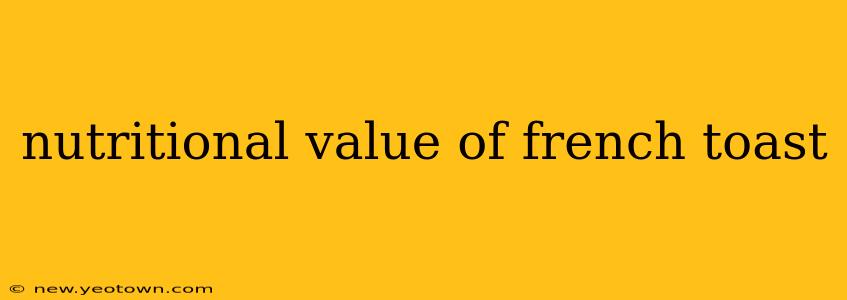French toast. The very words conjure images of cozy weekend mornings, golden-brown slices dripping with syrup, and a comforting aroma that fills the kitchen. But beyond the deliciousness, what's the real nutritional value of this beloved breakfast staple? Let's take a closer look, exploring the nutritional profile and addressing some common questions.
What is the nutritional value of French Toast?
The nutritional value of French toast can vary wildly depending on several factors: the type of bread used (white, wheat, sourdough), the amount of milk and eggs in the custard, the type and amount of cooking oil, and, of course, the toppings. A basic serving of French toast made with two slices of white bread, a little milk, and an egg, cooked in a small amount of butter, will offer a moderate amount of protein and carbohydrates, along with some fat. However, the addition of sugary syrups, whipped cream, or fruit compotes significantly impacts the overall nutritional value, often increasing the sugar and calorie content considerably.
Imagine this: a simple french toast made with whole-wheat bread, a splash of skim milk, and a touch of cinnamon. This version is far healthier than one made with white bread, whole milk, and drenched in maple syrup. The key lies in mindful ingredient choices.
How many calories are in French toast?
This is another question with a range of answers. A plain serving of french toast can fall anywhere from 150-300 calories, but adding toppings can easily double or even triple that number. A typical restaurant serving, loaded with syrup and whipped cream, can easily surpass 500 calories. To keep your calorie count in check, focus on portion control and healthier topping choices like fresh berries or a light sprinkle of powdered sugar.
Is French toast healthy?
This depends entirely on how it’s made and what’s added to it. French toast made with whole-wheat bread, less sugar, and healthy additions like fruit can contribute to a balanced breakfast. However, versions loaded with butter, syrup, and processed ingredients quickly become a less healthy option. The key is moderation and mindful ingredient selection.
What are the benefits of eating French Toast?
While not a superfood, French toast can offer some nutritional benefits, especially when prepared thoughtfully. Whole-wheat bread provides fiber, contributing to digestive health. Eggs are a great source of protein, essential for building and repairing tissues. The choice of milk also plays a role: skim milk adds protein without excessive fat. Choosing healthier ingredients ensures that your French toast contributes positively to your nutritional intake, rather than detracting from it.
Is French toast good for weight loss?
French toast, in its most basic form, isn't inherently detrimental to weight loss efforts. However, it's crucial to consume it in moderation and focus on making healthier choices in its preparation. A small serving of french toast made with whole-wheat bread and minimal added sugar can be incorporated into a balanced weight-loss diet. However, frequent consumption of heavily sugared and calorie-laden versions will almost certainly hinder weight loss progress.
What are some healthier alternatives to French Toast?
If you're looking for healthier breakfast options, there are many alternatives to consider. Oatmeal, yogurt with fruit, or a whole-wheat English muffin with avocado and egg are all nutritious and satisfying choices. However, there's no need to completely banish french toast; simply prioritize making it with the best ingredients you can find and enjoying it in moderation.
Conclusion: Enjoying French Toast Mindfully
French toast doesn't have to be a guilty pleasure. By understanding the nutritional impact of different ingredients and preparation methods, you can enjoy this delicious breakfast treat without compromising your health goals. Choose whole-wheat bread, use less sugar, and opt for healthy toppings like fresh fruit to elevate the nutritional value of your French toast. Remember, moderation is key to enjoying this comfort food as part of a balanced diet.

